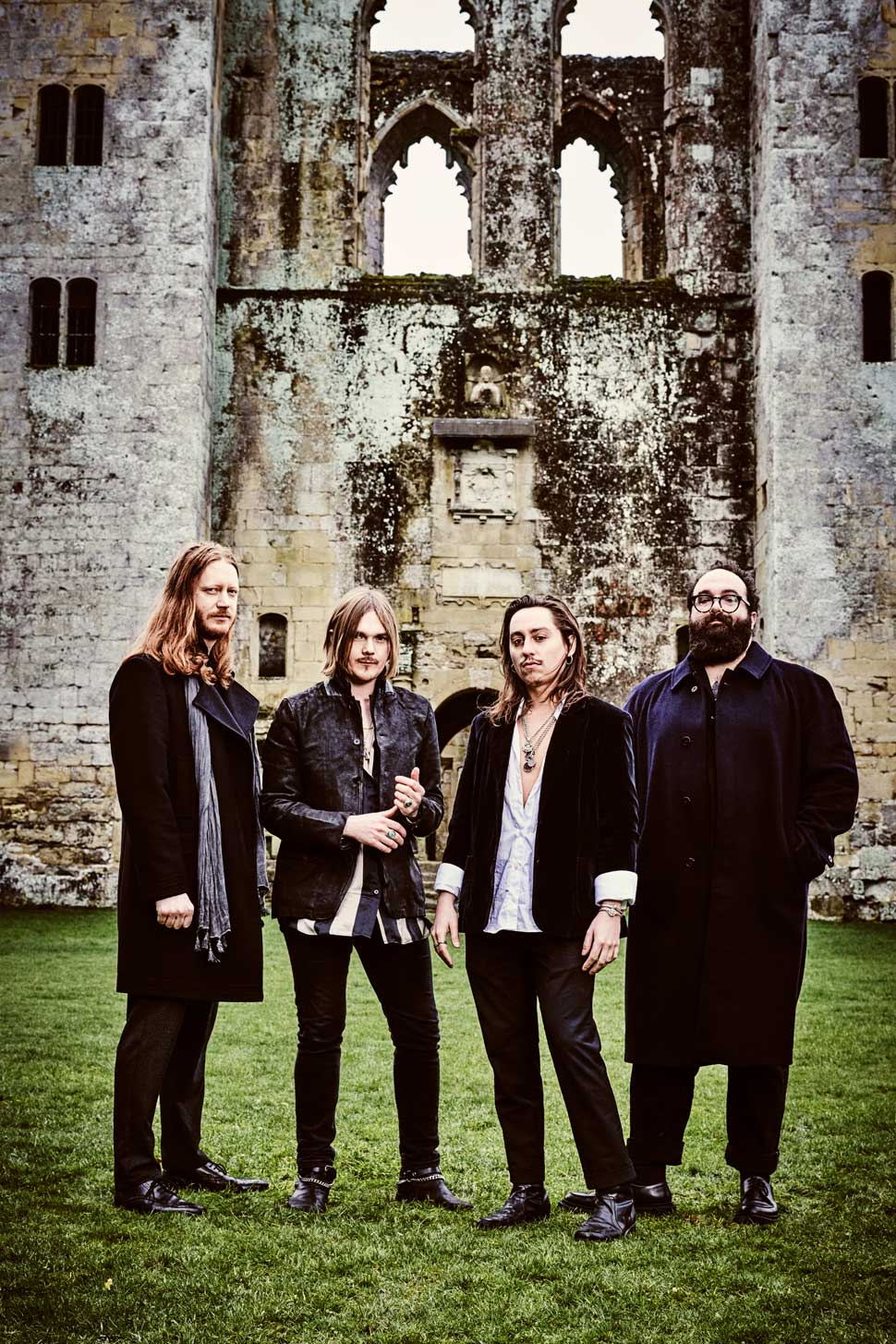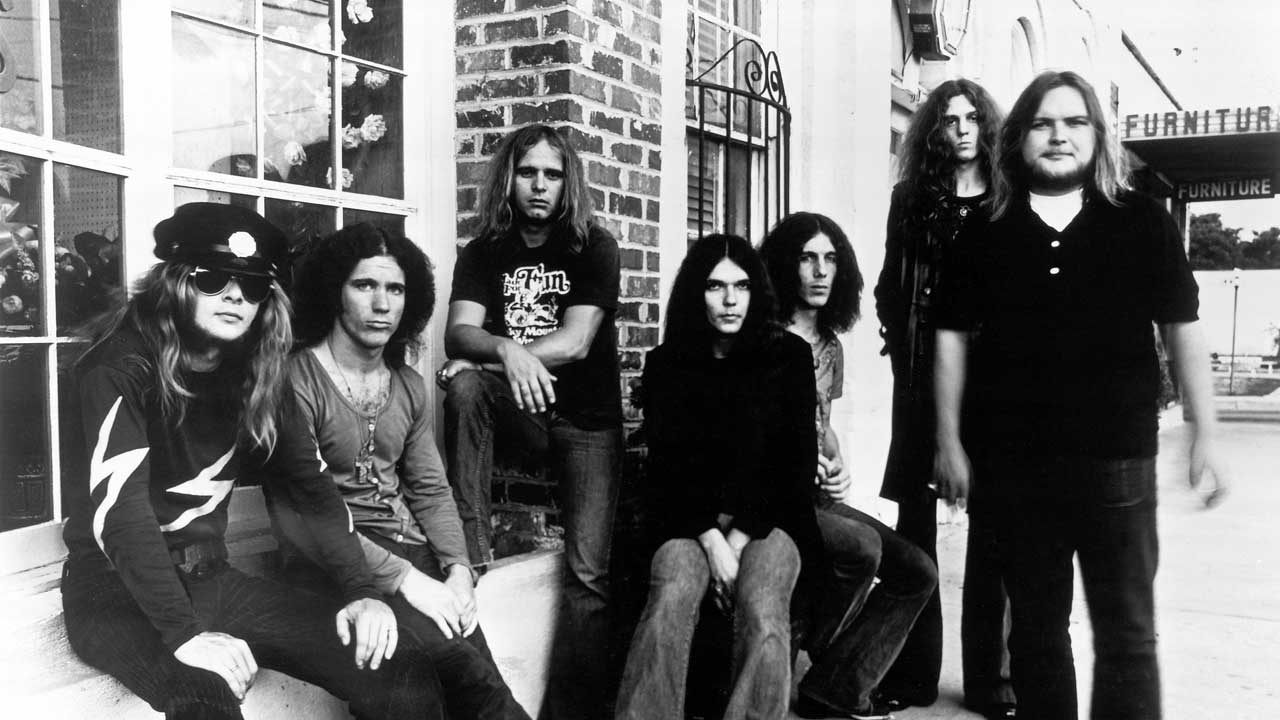"Are they gonna think I'm Beelzebub taking their precious baby away, breaking their hearts and defiling him?": What happened when Greta Van Fleet's guitarist got himself a new band
When the worlds of Greta Van Fleet’s Jake Kiszka and alt.folkie Chris Turpin collided, it was musical love at first sight. After a whirlwind romance, new project Mirador was born

Life moves fast in Mirador. They wrote their first 10 songs in a week. Their first gig took place in front of 12,000 people, opening for co-frontman Jake Kiszka’s ‘other’ band. At their first headline show, in Nashville, fans queued outside for two days straight. By night two, in New York City, they were singing the words to all the songs. Rapidly forming a Deadhead-style community, fans travelled together between cities, sharing intel, trading lyrics, making their own merch. Promising omens, certainly, for one of the hottest prospects in high-spec, nostalgic rock’n’roll since Jack White and Rival Sons began blazing that trail. All that, and at that point Mirador had yet to release a single piece of music.
“Those gigs were wild,” recalls Chris Turpin, nursing the remains of an iced black coffee, shades on in the Soho watering hole in which we’ve met. “Every show they were there from midnight the night before, queues around the block, they waited three hours after the show…”
Turpin, the British, lesser-known half of Mirador, plays in alt.folk duo Ida Mae with wife Stephanie Jean Ward (they previously founded short-lived blues mavericks Kill It Kid). An ardent lover of the early blues voices of Lead Belly, Elmore James and Blind Willie McTell – with the neat little moustache, chic threads and elegant gestures of an outlaw matador, plus a huge, distinctive voice that seems to come from somewhere primordial – he feels like a natural sparring partner for Greta Van Fleet’s old-soul, Pageian guitarist Kiszka.
The pair met backstage in Detroit, in 2018, where Ida Mae were opening on Greta Van Fleet’s US tour. Pushing past initial shynesses of one another, they came together over red wine, guitars and songs that felt ancient, mysterious, haunted; less electric blues rock, more unplugged legends of the Delta.
“Chris was this Zorro-like figure,” Jake Kiszka drawls as he joins us in the Royal George on Charing Cross Road, all loose black shirt (very open collar) and high-class hippie jewellery. “Like Stryder sitting at the end of the bar. I was immediately struck by his playing. It was really incredible. And some of that earlier blues and folk stuff, it’s really rare to find players who can do that.”
“I’ve grown up with those hyper-classic guitar heroes; I loved Cream, Hendrix, Paul Kossoff from Free,” Turpin says. “And all of a sudden this… prick was there, going to the front, the guitar behind the head, and to these screaming people. I remember catching him topless backstage and being like: ‘Where the fuck have you guys been?! I’ve been waiting for a band like you for ten years!’”
If huge-scale fan worship is comparatively novel to Turpin, it’s very much the norm for Kiszka. You can see it in the way he operates; the way he rocks up an hour late in a flurry of easy charm, just-washed hair and blown kisses, as management reps cluster around him and his new partner. Last night the two of them hit Soho, and they’re feeling it. Not long before our chat Kiszka was ordering room service and an IV at the upscale hotel they’re staying in.
Sign up below to get the latest from Classic Rock, plus exclusive special offers, direct to your inbox!
Of course, that isn’t really who he is. Get the 29-year-old chatting about the music he loves – country blues, European folk, classic rock, the self-titled record he and Turpin are currently promoting – and another, deeper part of him switches on. Still extravagant, still out-there, but drawing from the same well of old music, art and storytelling that’s set him and Turpin apart from their peers since childhood. They’re the real deal, essentially.
“It was like a nuclear reactor going off,” Kiszka enthuses, remembering the first Mirador gigs. “It’s incredibly exciting. Because when you play in a band for years and years, there comes a point where the change in evolution becomes a bit more incremental. But what’s really exciting about this band is that everything is so fresh. Every single night is drastically different. There’s constant change, constant growth, constant communication.”
“It was sink or swim,” Turpin says. “Like: ‘Are these Greta fans gonna love this? Or are they gonna think I’m Beelzebub taking their precious baby away, breaking their hearts and defiling him?!’ But to see them get invested in it has been amazing. Tickets went so quickly. Mainly Jake fans.
"Ida Mae fans aren’t that quick off the mark,” he finishes with a wry grin. “And there aren’t as many.”
Completed by two crack-shots from the London session scene – drummer Mikey Sorbello (of The Graveltones and more recently Jay Buchanan’s solo band) and bassist Nick Pini (Laura Marling, Nick Mulvey, Buchanan’s solo band also) – Mirador take Kiszka and Turpin’s old-world source material and make it fulsome and fiery. Accordingly, Mirador is a rock’n’roll record, no question. And yet it retains the spirit of an acoustic work, its feral, from-the-woods soul offset by early-70s power. Moments of real intimacy complimented by raw heat, aggression, groove.
“But I think it heightens the intensity of everything else, to have those intimate, revealing moments,” Jake says. “It creates a deeper dimension, and far more dynamics within the record. Something really magical happened in the creation, the process of that.”

Mirador came together in earnest, like so many, during the pandemic. With both Kiszka and Turpin living in Nashville at that time, they decided to bite the bullet and actually make some music together.
“It was quite sweet. I think we were both quite nervous of each other at first,” Turpin reasons. “But we had time to hang out. Kiszka played on the Ida Mae album we were working on, and sort of slowly we just became friends.”
In 2023 the pair holed up for a week at the beautiful wooden Victorian house Kiszka was living in. They sat with a pad of paper and two acoustic guitars. Turpin pulled lyrics from old ballad books. Characters emerged. Songs began to weave together, guitar parts and harmonies fusing in clever, instinctive patterns. The delicate, lovelorn ghosts of Must I Go Bound. The emotive yearning and Zeppelin-esque swell of Fortune’s Fate. Skyway Drifter’s acoustic intro was demoed in the attic at three in the morning (the same sun-streaked version you’ll hear on the finished record).
“There’s direct harmonies, but there’s also counter melody,” Kiska explains, “and it’s like a dance of all of it. Sometimes I’m just singing an alternative melody over top of the [main] melody, and Chris is underneath, and it’s strange but it works. There are some things that have become sort of ‘Miradorian’ in some ways.”
Both the sole guitar players in their other bands, they were drawn to the image of the lone gunslinger. Roaming, renegade characters with distinctive styles from which the blues first grew.
“The styles of music are all so different and beautiful and idiosyncratic,” Turpin muses. “Skip James doesn’t sound like Lightning Hopkins. Lightning Hopkins doesn’t sound like Blind Blake. Blind Blake doesn’t sound like Reverend Gary Davis. That, for me, was just so intoxicating. These guys stood on their own, in their own vernacular of playing. Same with the early folk guys like Martin Carthy, Bert Jansch, John Renbourn, all very stylistically independent of one another.”
The bulk of Mirador came out of that week in Nashville. But to turn it into a real rock’n’roll record they travelled to producer Dave Cobb’s studio by the swamps of Savannah, Georgia. Surrounded by gorgeous gear, culture and folklore (Blackbeard’s ship was said to be moored close by), they recorded live, using a type of console used by Led Zeppelin, and drank rum in old pirate bars. Absorbing the local history – and working with a “high-fidelity” mix of vintage and modern equipment – left a kind of feral cowboy streak on the hard-rocking, powerhouse tempers of Blood And Custard and Ashes To Earth.
“Some modern witchcraft,” Turpin says. “Dave basically said, ‘I don’t think anyone’s cut a record through equipment like this for at least 40 years.’” “There’s, like, five Helios boards on the planet, and Dave’s got one of them,” enthuses Kiszka. “So to use that and get that sound, it was a huge deal.”
If you look at each of Kiszka and Turpin’s roots, it’s not hard to see how they fell in love with all this. They had similarly freerange childhoods in “artistically affluent” households. Their tastes were wildly out of tune with those of their peers. The guitar became something they could disappear into, as well as a springboard into the wider world.
In Norwich, Turpin was raised by his mother, a “mad bohemian” piano teacher who also wrote poetry. He began disappearing to the coast as a teenager, getting into various shades of trouble. At 15 he started playing a beat-up acoustic guitar at home and poring over recordings by blues and folk pioneers in the library.
“I’d come home, late at night after being out with friends, doing things you shouldn’t, and just put on everything Robert Johnson recorded, and Mississippi Fred McDowell, and just disappeared into that world. They became my heroes.”
Meanwhile, in smalltown Michigan, Kiszka and his brothers grew up running wild in surrounding streams, fields and forests, their well-read, music-loving parents having shut the door and told them to “go play”. Often they’d be gone for a day or two. On the school bus (the radio blasting Maroon 5 and other stars of the moment) Kiszka longed to get home and play Charley Patton songs.
“I always had my guitar with me. Sometimes I’d take it to school – and get it taken away. So that was my connection to the world outside of the place that I came from – this vast world that I had yet to understand, but was drawn to.”
Now, in their own audiences, Mirador are seeing a new generation of young people fired up by those same old sounds. Teenagers, twenty- and thirtysomethings have dominated their audiences thus far. A community, Turpin is the first to say, that Jake and Greta Van Fleet have built.
“The energy of these shows,” he says incredulously. “People are fucking screaming. It might not be a huge production, but the dynamic in the room is so cool.”
“I’d be just as pleased seeing anybody showing up to experience what we’re trying to put out,” Kiszka muses. “[But] there’s another level of reciprocation seeing our own generation in the audience. When was the last time, really, a generation got into rock’n’roll like that?”
Question marks hover over Mirador’s future. A new Greta Van Fleet record, the follow-up to 2023’s Starcatcher, is in the works, as are other projects from Kiszka’s bandmates. Turpin and his wife Stephanie produce and write with other artists, alongside their work as Ida Mae. Recently they made steps into the film soundtrack world. They also have two children together, the youngest born earlier this year.
But new Mirador plans are afoot already. Before coming to London for promo, they began writing for a second album at Turpin and Stephanie’s new space in the Cotswolds. Something about this band, for now at least, seems to have a hold on both men.
“Mirador feels like it’ll turn into this raging beast that’s going to take up a lot of time,” Turpin says with a grin, not looking at all downcast at the prospect.
“This is such a time of creative excitement that I’m drawn to Mirador as often as I can,” Kiszka says. “It’ll be interesting to see what we develop as time goes on, and how we pace this thing.”
Mirador is out now via Republic. Mirador's UK and EU tour runs from November 3 to 16.

Polly is deputy editor at Classic Rock magazine, where she writes and commissions regular pieces and longer reads (including new band coverage), and has interviewed rock's biggest and newest names. She also contributes to Louder, Prog and Metal Hammer and talks about songs on the 20 Minute Club podcast. Elsewhere she's had work published in The Musician, delicious. magazine and others, and written biographies for various album campaigns. In a previous life as a women's magazine junior she interviewed Tracey Emin and Lily James – and wangled Rival Sons into the arts pages. In her spare time she writes fiction and cooks.
You must confirm your public display name before commenting
Please logout and then login again, you will then be prompted to enter your display name.


